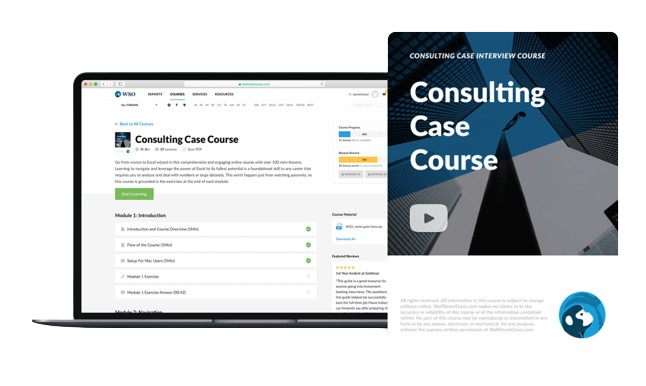Management Consultant Job Description
Career Insights and Pathways to Management Consulting
Management Consultant Job Description
Management consulting involves the expertise of specialized professionals, typically employed by consulting firms, who provide strategic guidance to organizations seeking performance improvement or solutions to specific business challenges.
Companies like McKinsey, BCG, and Bain are extremely selective, handpicking only a few lucky candidates from a sea of applicants every year.
Whether you're just starting your journey or looking to advance your consulting career, this guide is your trusted companion. It'll help you navigate the intricate landscape of consulting jobs and provide you with proven strategies to stand out from the crowd.
But it's not just about having an outstanding resume. To truly excel, you need to grasp the essence of the job and develop the essential skills.
Within this guide, we'll offer an insider's view into what management consultants do at different stages, from rookies to top-tier partners. Furthermore, we'll dive deep into the critical competencies you'll need, such as sharp analytical thinking, creative problem-solving, effective leadership, and impeccable communication.
Key Takeaways
- Management Consultants are professionals who advise organizations on improving their performance, solving business problems, and implementing strategic initiatives.
- The role equips you with essential skills, including analytical prowess, project leadership, strategic advisory capabilities, and executive presence, which can propel your career forward.
- Management Consultants engage with clients at all levels of the organization, from senior executives to frontline staff, to understand their business objectives, challenges, and opportunities.
- Management Consultants assist clients in formulating and refining their strategic plans, business models, and organizational structures to drive growth, innovation, and sustainability.
Management Consultant Duties and Responsibilities
Clients hire management consultants to provide strategic advice and implementation support on major business issues and organizational change initiatives. They take on high-impact strategic projects that span functions and require a combination of problem-solving, analytical, technical, and relationship skills to execute.
Some examples of management consultant responsibilities include:
- Conducting in-depth analysis of clients' businesses, operating models, processes, data, systems, and value chains
- Synthesizing findings into insights and developing strategic recommendations
- Building complex financial models to analyze scenarios and illustrate data insights
- Designing and executing operational improvement initiatives to achieve strategic goals
- Leading workshops, interviews, focus groups, and requirements-gathering sessions
- Managing large transformational programs from conception through implementation
- Developing communications strategy and materials to illustrate recommendations
- Presenting analysis and recommendations to executive audiences
- Project managing multifunctional client teams and workstreams.
- Supporting change management and aligning stakeholders
Management consultants operate as advisors and partners to their clients. They provide an outside objective perspective and access to cross-industry best practices and learnings. The role requires strong problem-solving, communication, and influencing skills.
Types of Management Consultants
As we understood, a management consultant plays an important role in assisting organizations to thrive and overcome business challenges.
These experts come in various specialized forms, each offering unique solutions and strategies. To understand the various forms, here are six key types of management consultants and their primary areas of focus:
| Type of Management Consultant | Description |
|---|---|
| Strategy Consultants | Develop high-level business strategies for competitive advantage. |
| Operations Consultants | Optimize internal processes and improve organizational efficiency. |
| IT Consultants | Implement and manage information technology solutions for businesses. |
| Financial Consultants | Assist with budgeting, investments, and financial planning. |
| Human Resources Consultants | Focus on HR tasks like recruitment, training, and employee relations. |
| Change Management Consultants | Guide organizations through transitions and change implementations. |
Consultant Career Progression Path in Management Consulting
Progression depends on performance, client and team feedback, and tenure. The fastest path from Analyst to Partner typically takes about 8-10 years but can vary based on individual trajectory.
Top firms receive thousands of applicants for only a couple hundred analyst openings. Standing out requires demonstrating analytical horsepower, leadership potential, and fit with the firm's values.
Once hired, consultants progress quickly in responsibility and title through strong performance and positive feedback.
However, the "up or out" nature also leads many to pivot into related corporate roles after a few years rather than pursuing a partnership.
Either way, the experiences gained in the early consultant rounds equip individuals to thrive in business leadership, strategy, and operational roles across various industries.
The management consulting profession, while demanding, kickstarts career trajectories for top talent.
Management Consultant Analyst
Analysts are typically either undergraduates or MBAs in their first 1-2 years out of school. Key responsibilities include:
- Conducting detailed analytical work, including research, benchmarking, interviews, data analysis, and financial modeling
- Drafting presentation decks and documents that summarize analyses
- Compiling findings and insights from team members into integrated presentations
- Assisting with project management and workstream coordination
- Supporting manager and partner-level team members on various needs and tasks
Analysts undertake the critical analytical work that underpins consulting engagements. They build foundational skills in research, modeling, synthesis, and communication.
The role demands strong individual contributions to support client initiatives. Analysts operate in a learning mode to absorb industry and strategic contexts quickly.
Much of the analytical heavy-lifting of consulting projects falls on the Analysts. They also take on critical support activities that keep engagements running smoothly. The role develops core problem-solving, data analysis, communication, and client service skills.
Management Consultant Senior Associate/Consultant
After 2-3 years, standout Analysts progress to the Consultant or Senior Associate level. Here, they transition from pure analysis into more client engagement:
- Taking on increased scope and responsibility for deliverables
- Spearheading specific work streams within broader initiatives
- Independently interfacing with client executives to gather data
- Leading portions of workshops and presenting findings
- Beginning to guide more junior team members and develop management skills
At this level, consultants increasingly engage directly with clients to lead components of projects. They take greater ownership over workstreams and oversight of more junior team members.
Broader visibility builds client relationship abilities and advisory skills. This represents an inflection point where influencing and relationship skills become more critical based on broader ownership.
Management Consultant Manager/Project Leader
Consultants lead small teams on sizable client engagements at the Manager or Project Leader level. Responsibilities include:
- Leading 3-5 person teams on focused projects or workstreams
- Independently scoping, budgeting, and pricing projects
- Being the day-to-day lead consultant who interfaces with the client
- Delivering end-to-end solutions from problem diagnosis through recommendations
- Coaching and providing hands-on development of more junior team members
- Contributing to new business proposals and sales pursuits
Managers orchestrate consulting teams and day-to-day engagement delivery. They interface closely with clients to translate needs into solutions. The role rounds out project leadership abilities and business development contributions.
Managers serve as the face of the firm and phase of delivery. They hone project leadership abilities while mentoring more junior colleagues.
Management Consultant Senior Manager/Principal
With 5-8 years of experience, consultants progress into overseeing entire complex engagements and large teams:
- Leading 10+ person teams to deliver on multifaceted projects
- Being the key point of contact for client executives
- Structuring the work plan and coordinating all workstreams
- Maintaining responsibility for budget, timeline, risk management, and quality
- Reviewing and providing input on all key analyses and deliverables
- Acting as lead advisor in proposing recommendations and strategy
Seniors oversee complex, multifaceted initiatives and large consulting teams. They act as lead advisors in engaging with executive clients on strategy.
The focus reaches full engagement leadership and integrated solution development. At this level, the focus expands to full engagement leadership and advisory.
Management Consultant Partner/Director
Partners or Directors represent the most seasoned consultants with over 8+ years of experience. They hold profit and loss ownership and the highest client relationships. Responsibilities include:
- Owning relationships with executive-level clients
- Identifying and selling integrated solutions for strategic client issues
- Structuring pursuits and contracting new business engagements
- Leading pursuits and new account development
- Being ultimately responsible for delivery across multiple engagements
- Mentoring and developing a talent strategy
- Contributing to the firm's strategy and vision
Partners have mastered client relationships, new business, talent development, and strategic leadership. They hold responsibility for overall practice vision, direction, and financial performance.
Progression to partner is the pinnacle of achievement in the consulting career journey.
Partners focus heavily on client relationships, new services, talent development, and strategic leadership for the practice. Progression to Partner is highly competitive.
The career ladder enables consultants to gain increasing responsibility for teams, clients, projects, and strategy. Internal mobility is a defining feature of consulting roles across all levels.
Qualifications and Experience Required for Consultants
Here are some of the key skills and qualifications required to be a strong management consultant:
- Analytical abilities: Management consultants must synthesize complex business problems and data sets into strategic insights. Strong logical thinking and data analysis skills are mandatory.
- Intellectual curiosity: The job involves learning new industries, business models, and organizations quickly. Natural curiosity and the ability to ask good questions is critical.
- Financial modeling: A core skill set is building models to analyze profit drivers, ROI, sensitivities, scenarios, and project returns. Excel modeling expertise is essential.
- Strategic mindset: Consultants must see the big picture and make recommendations aligning with clients' goals. Systems thinking and creativity enable this.
- Relationship building: Forming trusted advisor relationships with clients and influence is crucial. Communication, emotional intelligence, and client service skills are key.
- Problem-solving: Juggling ambiguous problems and driving recommendations is daily work. Structured frameworks and creativity both drive effective problem-solving.
- Executive presence: As an advisor to senior leaders, consultants must convey confidence and credibility, strong communication skills, and polish matters.
- Collaborative leadership: Consultants manage teams and work streams without direct authority. Collaborative leadership and matrix management abilities enable execution.
- Change management: Driving major change is hard. Understanding organizational psychology, change management, and coaching helps ensure adoption.
- Time and project management: Simultaneously managing multiple complex client initiatives is standard. Strong organization and efficiency are mandatory.
The management consultant role combines strategy, analysis, relationship building, problem-solving, and project management in a client services model. The blend of hard and soft skills required is unique.
A Typical Day for a Management Consultant
The life of a management consultant is intense and dynamic. They invest 60 to 80 hours per week, driven by tight client deadlines, fast-paced projects, and multiple complex initiatives. They adapt to unpredictable changes, and travel was common before COVID-19.
Achieving a work-life balance is feasible but requires setting boundaries. Consultants value intellectually stimulating work and learning opportunities. Each day offers a chance to significantly impact, solve intricate problems, and contribute to client and team success.
The management consultant lifestyle is intense. Hours average 60-80 hours per week driven by:
- Tight client deadlines and fast-paced projects
- Juggling multiple complex initiatives in parallel
- Last-minute requests and unpredictable changes
- Extensive travel to be onsite with clients (pre-COVID)
- Pitching new business in pursuit processes
Work-life balance is certainly possible but requires deliberately setting boundaries and managing expectations. The hours are demanding, but the intellectually stimulating work and tremendous learning opportunities offset the time commitments for many.
Conclusion
Management consulting offers immense personal and professional development opportunities. The role exponentially builds critical thinking, problem-solving, leadership, and strategic advisory skills.
Consultants drive real impact while gaining exposure to diverse industries and business models.
However, the job requires stellar intellectual horsepower, resilience, and work ethic to thrive. The recruitment processes are extremely selective. Showcasing alignment to consulting capabilities is crucial.
This guide outlined the core responsibilities and progressions across levels. It highlighted key analytical, project management, communication, and relationship-building competencies. With intentional positioning and preparation, you can stand out among ultra-competitive applicants.
For those considering a career in consulting, it's essential to recognize that consulting opens up pathways to accelerate strategic impact.
The demanding pace and steep learning curve pay dividends for driven professionals. The insights gained from this guide offer valuable knowledge that can help you demonstrate your readiness and distinguish yourself when pursuing a coveted consulting role.
Consulting opens up pathways to accelerate strategic impact. The demanding pace and steep learning curve pay dividends for driven professionals. Leverage this insight to demonstrate your readiness and achieve a coveted consulting role.
Management Consultant Job Description FAQs
Top majors for management consulting include economics, business, statistics, engineering, mathematics, physics, and computer science. Analytical horsepower is valued. Liberal arts majors can also thrive with sufficient quantitative coursework.
The top three strategy consulting firms (McKinsey, Bain, BCG) are considered dream pre-MBA roles. Admissions values the training received and the internal brand names of MBB. Entrepreneurship and investment banking are also viewed favorably.
Pre-pandemic travel ran 60-80%, given the need for onsite client collaboration. Remote work has reduced travel temporarily, but some in-person presence is still valued long-term. Expect moderate travel balancing virtual and onsite as norms evolve.
Highlight problem-solving experience, analytical projects in school or work, leadership roles, community impact, and passion for the firm’s mission. Quantify achievements when possible. Convey intellectual curiosity and desire to make a difference.
Management consulting is an excellent launching pad for future careers, given the training received in problem-solving, strategic thinking, project leadership, and business functional knowledge. Top firms also open doors. The tradeoff is high intensity and travel in the early years.
Free Resources
To continue learning and advancing your career, check out these additional helpful WSO resources:




or Want to Sign up with your social account?